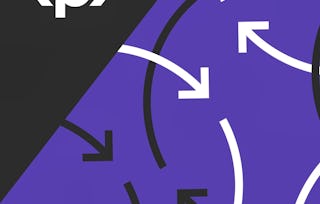Mise à jour en mai 2025.Ce cours intègre désormais Coursera Coach ! Une façon plus intelligente d'apprendre avec des conversations interactives en temps réel qui vous aident à tester vos connaissances, à remettre en question vos hypothèses et à approfondir votre compréhension au fur et à mesure que vous progressez dans le cours.Ce cours de programmation Ruby commence par vous guider dans l'installation sur différents systèmes d'exploitation, couvrant macOS et Windows, afin de construire une base solide. Vous apprendrez la navigation en ligne de commande, l'installation d'outils et l'écriture de votre premier code Ruby.

Principes fondamentaux de Ruby et concepts de base de la programmation

Principes fondamentaux de Ruby et concepts de base de la programmation
Ce cours fait partie de Spécialisation Apprendre à coder avec Ruby
Enseigné en Français (doublage IA)

Instructeur : Packt - Course Instructors
Inclus avec
10 avis
Expérience recommandée
Ce que vous apprendrez
Installer et configurer Ruby sur différents systèmes d'exploitation.
Appliquer les principes de la programmation orientée objet en Ruby.
Écrire et déboguer des programmes Ruby en utilisant diverses méthodes et structures de contrôle.
Utiliser les fonctionnalités avancées de Ruby pour développer des applications complexes.
Compétences que vous acquerrez
- Catégorie : Environnements de développement intégré
- Catégorie : Débogage
- Catégorie : Interface de ligne de commande
- Catégorie : Installation du logiciel
- Catégorie : Apple Xcode
- Catégorie : Programmation Informatique
- Catégorie : Principes de programmation
- Catégorie : Microsoft Windows
- Catégorie : Programmation orientée objet (POO)
- Catégorie : Environnement de développement
- Catégorie : Ruby (Langage de programmation)
- Section Compétences masquée. Affichage de 7 compétence(s) sur 11.
Détails à connaître

Ajouter à votre profil LinkedIn
5 devoirs
Découvrez comment les employés des entreprises prestigieuses maîtrisent des compétences recherchées

Élaborez votre expertise du sujet
- Apprenez de nouveaux concepts auprès d'experts du secteur
- Acquérez une compréhension de base d'un sujet ou d'un outil
- Développez des compétences professionnelles avec des projets pratiques
- Obtenez un certificat professionnel partageable

Il y a 8 modules dans ce cours
Dans ce module, nous vous présenterons le langage de programmation Ruby, son contexte historique et sa comparaison avec d'autres langages. Vous apprendrez à configurer l'environnement de développement sur macOS et Windows, y compris l'installation d'outils essentiels comme XCode, Homebrew, rbenv et VSCode. À la fin, vous écrirez et exécuterez votre premier programme Ruby en utilisant à la fois le Terminal et PowerShell.
Inclus
17 vidéos2 lectures
Dans ce module, nous allons nous plonger dans les concepts fondamentaux de la programmation en utilisant Ruby. Vous découvrirez les différentes méthodes de sortie de texte, telles que " puts ", " print " et " p ", et vous apprendrez à utiliser les caractères d'échappement pour formater les chaînes de texte. Nous aborderons également les opérations arithmétiques de base, la concaténation de chaînes et la Gestion des exceptions, afin de fournir une base solide pour la poursuite de la programmation en Ruby.
Inclus
11 vidéos
Dans ce module, nous nous concentrerons sur les variables en Ruby, en vous apprenant à les déclarer et à les utiliser efficacement. Vous apprendrez ce qu'est la portée d'une variable, l'affectation parallèle et l'échange de valeurs. Nous introduirons également les constantes et couvrirons les exceptions courantes telles que " NameError ", afin que vous puissiez manipuler les variables en toute confiance dans vos programmes.
Inclus
8 vidéos1 devoir
Dans ce module, nous allons explorer les méthodes d'objets en Ruby. Vous apprendrez à appeler des méthodes sur différents objets, à enchaîner des méthodes pour plus d'efficacité et à utiliser la méthode "inspect" pour le débogage. Nous aborderons également le concept de l'objet " nil ", l'interpolation de chaînes de caractères, l'entrée utilisateur avec la méthode " gets " et la conversion d'objets entre types, ce qui nous permettra d'acquérir une compréhension complète des méthodes objet de Ruby.
Inclus
11 vidéos
Dans ce module, nous allons présenter les booléens et les méthodes de prédicat en Ruby. Vous découvrirez les opérateurs d'égalité et d'inégalité, les comparaisons mathématiques et la manière d'utiliser les méthodes de prédicat qui renvoient des valeurs booléennes. Nous aborderons également les méthodes avec arguments, notamment la gestion d'arguments multiples et les méthodes spécifiques pour les objets Float, améliorant ainsi votre capacité à écrire du code Ruby logique et efficace.
Inclus
10 vidéos
Dans ce module, nous nous concentrerons sur la définition et l'utilisation de méthodes en Ruby. Vous apprendrez à créer des méthodes avec des paramètres, à passer des arguments et à les manipuler au sein de vos méthodes. Nous discuterons de la portée des variables locales, de la façon de retourner des valeurs explicitement et implicitement, et de la façon de configurer des paramètres optionnels avec des arguments par défaut, ce qui vous permettra d'acquérir des compétences essentielles pour créer du code réutilisable et modulaire.
Inclus
9 vidéos1 devoir
Dans ce module, nous présenterons les blocs en Ruby, en nous concentrant sur leur utilisation avec les méthodes. Vous apprendrez à déclarer des variables de bloc et à transmettre des données entre les méthodes et les blocs. Nous aborderons également les méthodes d'itération telles que " upto ", " downto " et " step ", ce qui vous permettra d'écrire des boucles concises et puissantes dans vos programmes Ruby.
Inclus
5 vidéos
Dans ce module, nous allons explorer les instructions conditionnelles en Ruby, en vous apprenant à créer une logique de branchement avec les instructions if, elsif et else. Vous apprendrez à combiner des conditions à l'aide d'opérateurs logiques, à définir la priorité avec des parenthèses et à imbriquer des instructions if pour une logique complexe. Nous aborderons également l'instruction case et l'Opérateur logique ternaire, ce qui vous fournira des outils pour écrire une logique conditionnelle propre et efficace dans vos programmes Ruby.
Inclus
16 vidéos1 lecture3 devoirs
Obtenez un certificat professionnel
Ajoutez ce titre à votre profil LinkedIn, à votre curriculum vitae ou à votre CV. Partagez-le sur les médias sociaux et dans votre évaluation des performances.
Instructeur

Offert par
En savoir plus sur Développement de logiciels
 Statut : Essai gratuit
Statut : Essai gratuitPackt
 Statut : Essai gratuit
Statut : Essai gratuit Statut : Essai gratuit
Statut : Essai gratuit
Pour quelles raisons les étudiants sur Coursera nous choisissent-ils pour leur carrière ?

Felipe M.

Jennifer J.

Larry W.

Chaitanya A.
Avis des étudiants
- 5 stars
80 %
- 4 stars
10 %
- 3 stars
0 %
- 2 stars
0 %
- 1 star
10 %
Affichage de 3 sur 10
Révisé le 7 mars 2025
The assignments are not quite correct and sometimes you'd be graded less. But the course info materials are quite good.

Ouvrez de nouvelles portes avec Coursera Plus
Accès illimité à 10,000+ cours de niveau international, projets pratiques et programmes de certification prêts à l'emploi - tous inclus dans votre abonnement.
Faites progresser votre carrière avec un diplôme en ligne
Obtenez un diplôme auprès d’universités de renommée mondiale - 100 % en ligne
Rejoignez plus de 3 400 entreprises mondiales qui ont choisi Coursera pour les affaires
Améliorez les compétences de vos employés pour exceller dans l’économie numérique
Foire Aux Questions
Oui, vous pouvez visionner la première vidéo et le syllabus avant de vous inscrire. Vous devez acheter le cours pour accéder au contenu qui n'est pas inclus dans l'aperçu.
Si vous décidez de vous inscrire au cours avant la date de début de la session, vous aurez accès à toutes les vidéos et à toutes les lectures du cours. Vous pourrez soumettre vos travaux dès le début de la session.
Une fois que vous vous serez inscrit et que votre session aura commencé, vous aurez accès à toutes les vidéos et autres ressources, y compris les lectures et le forum de discussion du cours. Vous pourrez consulter et soumettre des évaluations pratiques, et effectuer les devoirs notés requis pour obtenir une note et un certificat de cours.
Plus de questions
Aide financière disponible,


